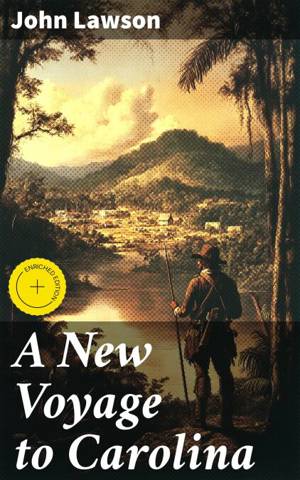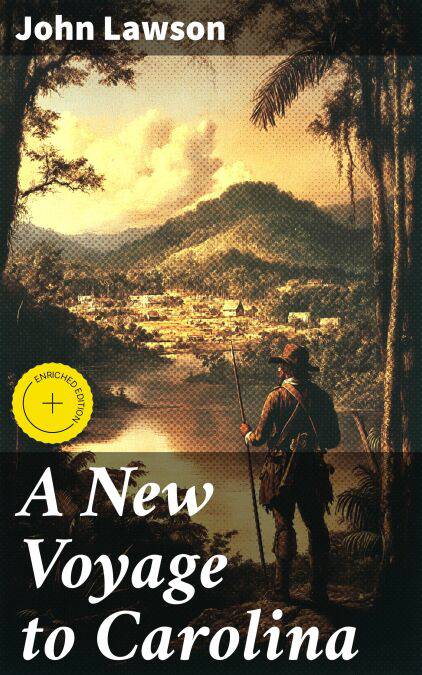
Bedankt voor het vertrouwen het afgelopen jaar! Om jou te bedanken bieden we GRATIS verzending (in België) aan op alles gedurende de hele maand januari.
- Afhalen na 1 uur in een winkel met voorraad
- In januari gratis thuislevering in België
- Ruim aanbod met 7 miljoen producten
Bedankt voor het vertrouwen het afgelopen jaar! Om jou te bedanken bieden we GRATIS verzending (in België) aan op alles gedurende de hele maand januari.
- Afhalen na 1 uur in een winkel met voorraad
- In januari gratis thuislevering in België
- Ruim aanbod met 7 miljoen producten
Zoeken
A New Voyage to Carolina E-BOOK
Enriched edition. Exploring Carolina: A Journey Through Colonial Landscapes and Indigenous Tribes
John Lawson
E-book | Engels
€ 1,99
+ 1 punten
Uitvoering
Omschrijving
In "A New Voyage to Carolina," John Lawson embarks on an insightful journey through the Carolinas in the early 18th century, blending the genres of travelogue and ethnography. This seminal work intricately details Lawson's observations on the natural landscape, the indigenous tribes, and the burgeoning colonial society. His vivid prose captures the flora and fauna of the region, while his reflections reveal the complexities of European colonial encounters. As one of the earliest sources documenting life in the Carolinas, Lawson's narrative serves both as a personal memoir and a crucial historical document, offering readers a glimpse into the challenges and wonders of early American settlement. John Lawson was a surveyor and explorer whose background provided him with a keen eye for detail and a profound interest in the New World. His diverse experiences in surveying, cartography, and interactions with native populations informed his writing, enabling him to convey not only the landscape but also the intricate relationships between various cultures. His pioneering spirit and commitment to documentation reflect the broader trends of exploration in the 18th century, illuminating the motivations and uncertainties of European settlers during this transformative period. This book is highly recommended for those interested in early American history, colonial interactions, and the literary heritage of travel writing. Lawson's nuanced observations and engaging narrative style will appeal to both scholars and casual readers alike, offering a rich tapestry of cultural exchange and environmental wonder that is still relevant today.
In this enriched edition, we have carefully created added value for your reading experience:
- A succinct Introduction situates the work's timeless appeal and themes.
- The Synopsis outlines the central plot, highlighting key developments without spoiling critical twists.
- A detailed Historical Context immerses you in the era's events and influences that shaped the writing.
- A thorough Analysis dissects symbols, motifs, and character arcs to unearth underlying meanings.
- Reflection questions prompt you to engage personally with the work's messages, connecting them to modern life.
- Hand‐picked Memorable Quotes shine a spotlight on moments of literary brilliance.
- Interactive footnotes clarify unusual references, historical allusions, and archaic phrases for an effortless, more informed read.
In this enriched edition, we have carefully created added value for your reading experience:
- A succinct Introduction situates the work's timeless appeal and themes.
- The Synopsis outlines the central plot, highlighting key developments without spoiling critical twists.
- A detailed Historical Context immerses you in the era's events and influences that shaped the writing.
- A thorough Analysis dissects symbols, motifs, and character arcs to unearth underlying meanings.
- Reflection questions prompt you to engage personally with the work's messages, connecting them to modern life.
- Hand‐picked Memorable Quotes shine a spotlight on moments of literary brilliance.
- Interactive footnotes clarify unusual references, historical allusions, and archaic phrases for an effortless, more informed read.
Specificaties
Betrokkenen
- Auteur(s):
- Uitgeverij:
Inhoud
- Aantal bladzijden:
- 268
- Taal:
- Engels
Eigenschappen
- Productcode (EAN):
- 4066339538184
- Verschijningsdatum:
- 21/08/2023
- Uitvoering:
- E-book
- Beveiligd met:
- Digital watermarking
- Formaat:
- ePub

Alleen bij Standaard Boekhandel
+ 1 punten op je klantenkaart van Standaard Boekhandel
Beoordelingen
We publiceren alleen reviews die voldoen aan de voorwaarden voor reviews. Bekijk onze voorwaarden voor reviews.









